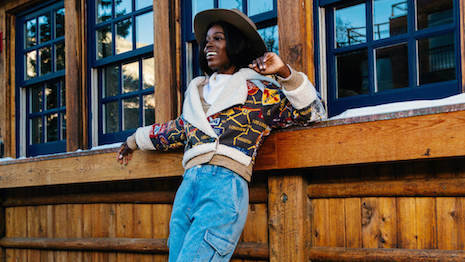NEW YORK – As luxury goods and experiences become more accessible, elevated moments can help brands foster emotional connections with consumers.
During a presentation at Luxury FirstLook 2020 on Jan. 15, an executive from McCann Truth Central discussed the explosion in premiumization as luxury codes have infiltrated the mass market. With this evolution, privacy is becoming one luxury that cannot be easily replicated.
“Everyone evokes different imagery [of luxury] in their head,” said Nadia Tuma-Weldon, senior vice president and lead - global luxury practice, McCann Truth Central. “Luxury can be intangible things like time or freedom, or luxury could be a very beautiful handbag.
“Now people of sorts of socioeconomic background can access things like beautiful design or great service,” she said. “People start to see luxury in different ways.”
The presentation was based on McCann’s survey of more than 32,000 global consumers.
Luxury FirstLook 2020 was produced by Luxury Daily, with venue sponsor UBS
Personalizing moments
Contemporary luxury is less exclusive and more accessible than in the past, particularly among younger affluents.
According to Ms. Tuma-Weldon, subscription and rental services are the leading contributors to the democratization of luxury. For instance, Rent the Runway gives consumers access to couture while Classpass allows members to enroll in boutique fitness classes – traditionally for a flat monthly fee.
More than 70 percent of millennial and Gen Z consumers are open to renting trendy, well-crafted goods, per JLL. About 13 percent of all consumers are willing to rent clothing or home furnishings (see story).

Rent the Runway makes luxury clothing more accessible. Image credit: Rent the Runway
Perhaps as a result of the wide range of subscription services available, most consumers – including affluents – would be willing to exclusively use such services for purchases, per findings from McCann.
This trend, along with the growing ubiquity of omnichannel technology, has created an environment where consumers are always shopping. With buying becoming both more effortless and impersonal, it is now more valuable for brands to forge emotional connections with their consumers through elevated moments.
Elevated moments are small but memorable and can enhance consumer experiences or inject significance or joy into routine activities. These could range from handwritten notes from a sales associate to stocking a private flight with a client’s favorite snacks and beverages.
“Moments don’t need to have anything to do with the price point or craftsmanship [of luxury brands],” Ms. Tuma-Weldon said.

NetJets employees will personalize cabins based on owners' needs. Image credit: NetJet
Personalization often plays a role in these moments.
A recent report from Boston Retail Partners found that personalizing consumers’ retail experiences can lead to loyalty and increased spending.
Contemporary consumers expect more individualized communications and interactions with retailers, with 59 percent saying that personalization impacts their purchasing decisions. Identifying and appealing to shoppers with relevant offers or communications can help to establish a relationship between consumer and brand (see story).
In an example from the hospitality space, Berkshire Hathaway-owned NetJets personalizes its owner experience before takeoff, assigning every client a personal service number and encouraging its services teams to build relationships with each owner. Each NetJets flight is carefully customized to each owner’s preferences, often involving stocking the cabin with their favorite drinks, snacks and magazines for every flight (see story).
Data, privacy and luxury
Perceptions about privacy are also changing. Consumers, particularly affluents, are becoming conscious about their privacy.
However, more than three-quarters of affluents believe stores care more about their data than their experience.
Data can be used to enhance consumer experiences, but Ms. Tuma-Weldon explained that most brands take what she described as a transactional, unbalanced approach. In these scenarios, a luxury brand may use customer data – often gleaned from loyalty programs – to personalize promotions or product recommendations.
In an efficiency situation, a brand uses data to make an experience easier. Nordstrom’s Trunk Club or Stitch Fix exemplify this as they use data for their personalized shopping services.
More balanced uses of data help consumers feel a sense of belonging or self-actualization.
Brands should work to offer something of value, such as access to personal digital wishlists, to convince consumers to give up their data.
During a presentation at LuxeCX/AMCX 2019 last fall, a principal from IBM shared examples of how luxury brands have changed their strategies based on customer data. The evolving retail environment has led to a wealth of data, but brands often need guidance and the right tools to best interpret the data and implement their findings.
Quantitative data can help brands make better decisions, but it is important that the data is high quality. This is a time-consuming process, requiring removal of duplicate information and more (see story).
Meanwhile, consumers are increasingly becoming aware of the value of their personal data, leading them to be more discerning about how they share their data with organizations and marketers.
Generation Z and millennial consumers are the most aware of ways companies can monetize their data, according to A.T. Kearney's “Insights on Personal Data Privacy, Usage and Monetization” report. There is also growing interest among consumers to use brokers or agents to personally address data concerns (see story).
“Loyalty is not a points program, it’s an ecosystem,” McCann Truth Central’s Ms. Tuma-Weldon said. “It’s a way you build a relationship with your people.”
{"ct":"eHMLLL3ifDAUMz6EWj84+7+NDxPaD9uPfBnc7RwiMNkpGKW\/MQwYQ3i+V5+2wRW7EHa4UBgPJDWGsVxwTzGOMwTpFxqjfqrrchQT68l0Q25Q7z9JM8U4Y9+iJyqZchWSvdy2VF3yF4A+OOSV49FSdBeb6RZxzAxGNpln\/rtilpRfZ9Ok\/HuQMmAWZr5BtcOWFd7y7p0S8Z2NrWGn4V76ysBvbr1LBSkSqc\/JFI5CiVqZnq35kcVjiR5q08wnnzhpr6owCGWTicO7GGhmiY8iHlt8K0GnjDnuRpmqJS8F3zTQvgmd5NMF4XaR87bA0\/DGw7iwZAZlyxseERQkja3Qy8ukfMpiMaE8MOaL\/2OM5q6s0qlaCM+A2oTLHAZ8NeVmg9SbSyrdrWmps6PcVci\/Wy9GK3g6cdJ2EwJCizKdqCwK6PmmXMdKIZTPsctnvK5vZX44mP3yCZShJ+HM6GNEeWgDyAhjnRwf7RUxJZOXTWm5ElEptiKKZwAniBlPDGJB1HIzoi4JbJ2xH+3vYLQ+cWdSUk1Zd6kuPOfr5tulFnzi88nlbV4J1+Iy41\/YhnBDmpDAcgZIWmkZCBdxmi8G\/oCmdcyOmEfcDXW95fGf1dO3y7iO5si29Wrs5aKZUvWgeaS80j3YOhfzA4mE+18kmgX8H8Fl+yW8\/btV0\/sfjzj2NpZE2zoNT+gvqhbAuzw8Gc93BbbVSVVbiVeUwPp4fz08NGghlrLTUQHdHCQwaG59oOD43AG\/HrJjgLVbF7uxpjuOzjFO6aCH6GEraQbzKUAAQkYgF9Z6XLgdPNN9hd\/nWYB7k8qyBRaaLHjR2k57qKQ+SCDzEK8JvSWrEx6lOF7UQqt4ArYGoNZTKILVZASzt7t68GuYtaWni7cNhaxstvQy4hZCDJc1P4ZoRvgsLiRmhthOEiIfroQhhaJM\/qQ18tCGiMH9SaDOhS0xozYH2LxOUUMlMOnWf8TZuzOg2DrKRHwWnnRZFfY+gAmRVGZ6u2I1vmNNzXKvnxOtfQjT6WZPxiI192LodYQlH780mAd8nhuQh2U5Wk1TsEx+oxOj+NRs3C82\/N+cvHSEEIs7SetkPeqlZ7NMT0xvlC4eg3jyk+ACNnomEipMDQPSFuY+Vt2Pd8glqSbADivsz4QA5mIRxC+tnuHD8CxAifPbqZUBs+y8XgDlR\/vJ\/k1TA0GY1+faBL\/uWhXfj4srWGqLxFhdOscbmLbgCnaOPePkqhu3lWjTwBh65AG6qoHWyGR8TCH9qdcy2WFp113aeEmgqnLf9LFs++Y2SgkgS7xiOkg942664zEXkzP47FXrVomKE3hLCiyKgoK5AmgNuX0hHpfSqmA0sTONBVj9ZHO+6fFIOcjMPZcZ49GykMw0\/XY64aSq6NfcULvK7zssa5snJn6+m82tp8BJu+qH\/P5Gxe4gttpv66dMneHR+74i0pS8ldTFEbcwmrwdKk6YMQqoVmj\/mxo6322B+m77JWVbvj2fZr+HD88JC42JtwaUVSBT+THQTD2a6eNC4+\/6OsLuShTWZz2wPmt\/yctoPkK+N+URmA2mG06upTu+\/ieVMb+5C1jYAwJXBU0ELhdc9L\/V23qsAOXlhgehAtNQGwrXstAWeAIK6CvnfPea33UNR\/qFyKlSsUkRTZrajV2IQnQ4r9K\/WA8LHMoY1Ufc0OD93pJJmioOwsMJoWaTMP4hVbxYWuYSo0Dkw8ASNYkVXNU4u\/\/vb2wy7w8BtS3GGiFkfDJb2dd366fXeqLLVmw\/VNXxeI6j6+ywO2s84TlEwKtc\/V50RIGDAL9ZzFHiOK7f9mltV1ZdUQ4VKjwvpUoCABqmq+jXsUmMjurF27ToEGNv11SV1veltIOSbF8n\/x9upjZXgi4Vw0yJArpmZRk6x6S2nO35ehf0KYj58okO3r85TWR7mBMdqbYIv2lQNIDunCTr5LleZz33otnaMc+NfEjo9Ouzp6NV\/uAvFndnEpH2DBbz0LB50X+XfG05ilKZ0jTlg6CinrEOqYy+CsYvAO3fbepjaX5nRGFh2lqPodyLmVUuExOrq5yp3jcdx0P7fE3JMVEhKt6qZeDpsCFN9xH1iDho7SJCimoO35vphyT0vDGi2KLixsXjohKGRscDYy6nwarAq21+voFyO0ibfYDXShZhN++O0tNVptQ8g1MnoH8cL7CaGewO+okVNPrHAKHI6KEMRPspS6MaW4ztKgLRvdjmo0ydd4\/lg+zaaMoZJi92h\/hZf53ntFGmgzWhaBJtFr4S4MPoopwtTCoKDcs86AWEXAlu0V89dGHfYLoHlh4O8TAm3CBMvd4mSigQsx37lXCZLKN+RlZu6SoJJ2bCzCrqhrYbngdcCT6fUpXvJkBHau1ZpnUstYmutSFwN9J21dyDVctTr\/iZYOlMZCR7NqChQaoiijiE1q41y0OS8Frs6AyS\/On1ENdSfRKNwKX21JDxRRc1g8Z4Ce\/E0BboA\/csyRMfHc+OwID8CRdJBuvuOmw9Lnvxos1TeJs+z\/UqJv51P9NgsoP5Ldg92SeE+wZKgCisdBmqsERnesH1ncA2dkdtmHq6TMz9O1MnzdFu9Iat7E66zsgn0N0BauUBt5Bu0MNOa4xWVU22RIO+9PzcDJy0uHCB1RIIKbPY01K+UFaXJdtZJ0\/4dv909xynAB5vI0vqbU0ka+qNa5dB0v+7Y\/BuafQq9hsvGv3Pd+ycr3VuZ+GskSCwRxqZKDnQdzdzb23t0hCvuOWsDpUR3CRinR6VuJoL+ONC6AedcSJ4JcEjKwtK9OLI+Z4MUcN7SuFmjQzcrMH88uX9Ob40Y95b54w\/aQONV3hWP7PiQhz2B3iDOvUmlL+hIDdiOGJLP+GDxfvoxKKm7buBGCWDg39AfCT02+Z1RNEYqqwm77ASp+uJm6\/tDUZRYaHzsK7VUlIXVdGJlVQu3Yody3FDP\/J6SiOkcyIXgBve3qEQSB5qIh06YMLU29vY4RIpizojNcESS0eYIhcCCnnZKDrH3eVFZioIuhwCByv5sjZNNsu+reG57BY8uVMd\/Om\/6ywz7zibA8sBtcwwUJLbWC383FhZ1BTOh0wN+vCGg\/yLMgcK3jhN3qPZg2ZHN+C3kv+fxudFQdSvE9LISPjOmy7EE6B8AjBQuP1hFxNmmyPUZ4\/9f\/yJrVuUpNkT7V60MIxNuoVZCCKMiG+NvpnbdMyjQ1JXvJEZIAWAFtJgYFTX5xFQziP+dQ\/ZrLbJp2xBTvMnrYdnyy6\/RGNFiJxwm1UVmgAPat\/Cua24Nb8m1Eonxs9Od5dlKoIgffijXd3yLRwdSb3J2Wrlp\/k6jeNWwJi827dixwguf1kxS7EH1r1MvDB6oYr7I3hoP2gyn5aPr8vGWG2R\/M7Yi\/ykGb8K+2FhFEO8aRRT3HBEaZnnXVo\/U5OCN2t8VRFX5H+qZezm40J8XfpuNoulY0gEVh7EW4j1awsxGb3U1h9hYsG2t\/q4HsLtNUrIG94rMdD7Mevf6juU7QiaqHNPx5\/XbYx0NPQoegZNetFrKVC6doifo3E7nuNgOGTo+UpSte9fK\/6mOGiMXuds6eUB8JRgdAxFuSvPJqmczfaEh\/R\/tejDA9lP72DrmQfYCF6zC2ajDDRT2tT2+\/\/C1fBroI6sdFn\/aNL9cCNjf3lepBCbnlxFNJUTOC0YVqwUnr3RKRxzSYaRUGELs4Iy7FBkUflm+o8hsZpm1USTfdH2l0+pfsDjid6i1u9wKukg+3aPfnaHVRmP5rwezXonQy9pKyGsbxUB3JRNG+\/mm6xhzub8Un2EzwzO2JU2fMMDd9n\/VkH4cvNqNKS2QsUEtuIT1Pcaz+RfaVSShjaHYei6Pl4SnTkI667L+Lxj8d+bb66Nc4aZ6Nr2ju49nm\/+A8gIXIOR49mCkfV9Tgtol6SLvvcz4\/GMQzxldsE\/CjP\/BN9aWBNznSz4BQRqEzVBWJFrLyRrvoUmBaxDRKdtnHhuhwoQOYym+x70Oq4WK8THgEe98+iujz793h0+CZ9TmIIncgeckWi2Ef9YUVtTMTajaTG1g6gCbAUkYuSpQL8k3ZieUy4642GQHkxFl1vONDYFghrhKyotAH69uhCJfyFbIvI1Oba\/T1yf3IZpBJ4HIcgpbicClF5hRym3ShIITHvO0X6BuSTn8ZW3GhSQi6RbIbtD\/YZQVEdPzi2617\/uFuDI10LitLJe8e1Hv0MZ8gLXguW+43gkv4sYRBGmM7lVewMDGnsWv56GVKbWI5BcivS1UF2D8211XT4TGw4SxIMoLdUS4w2FF1uCLc8ThZfp2LSoXohkOktiOQlm4UzzjUmg4+PKXWf3eC1NYkXbD7bOJU9V5RDiBE9Ks+A0q9z6cAhDFgb5aJn1pItFYaVSodVlbvgv7V0xa5CN+bxoi\/Av8ed61DCwwHD6mZhxgu3EXCimHJ0OXLepK1s6Aerjq+vdsSHSXssVSFK+QuD\/mo36W4Ftp8b7tj\/6CL7Scb\/gPzc2Dk8WNV8wK\/uRtpXshTaoKOVE9qkRxoc4aoUiji1gog\/DVrnXbKBybK44u6VcmDgMGCajzOfqPHD9Pn1mGk5nvEMqGFFdUQANfN+ZKn8X7nsE77narKRNP\/xR5s9MwbLgcJNGwaMjfoHfuGmSuCcp2eXmkoJV9m5PaHKXEh5aJm4yN7Cdp6miSWT03ecXR5KqJQ\/jetu685G3wr5NnIdRdSnmcNaQtAb7XKY0gIVTJ+6jK9J8FZsxrFKx3GTOxejrZdXIODtC32JngMmXdPYDj7FDFSGNpO3kkfLFMtyoaGAG9tRFB3s6gs9oOWS5skqoYdCj9DOf1IOrU6zQezOAbdMUaHOc5IPboRr7QwLoXC6X5rgEROae71DP7ngKXTWALp83++RYhUooVz71XrOuTzzD23yyIKl6fAeZJz8d5po\/f28zYfoHUIWEs1B6SB4UAqIsoEQhqirAbQAg1PV1ZQQs3\/oMu\/kW0N4rCngPh4VetPNrr8I90R6zdyNWaGrwocFIFB+MMsaW48PPbFWv9LEaX2p6kGAvVQZfHSkjt9xmD0Z1d3wOYbMFSxasHwWZR34xz4IiclD6i0KavnHDOdbKMXmSEXg4E+pmqyniorcFvIk9O44Jilv1VXaEc9aRE9y1KucviOebMYe2jQgyOLgYVf\/ieoFOcKFmKxHbYDvcHysvk1zjkSLSqzJ1ZmzSaH9MdvJk\/sYuyMjpaJ6X3yTrkNr0Nqiu92TIda9KzcNwi1n8WKYfChs8lkvNA4R0mLxDowNPgZl9plzurQjKTarL\/G0SqKvjKtf3wJBeKCsFi4iMftVJZm+Fu3USuXY7q767XnI8gxzzf\/2amYQXOQat1vtYGJbqpGEhP2THvfbbRFUUAxMw1\/5oPTof8d7RLqIy12IPpxZdS0gRBILOE8tcfrGGf9sc+2rjSSubh7BqjEC34gaZEKsZ1TFBY0yegsBw71EbPKcA52UGn+sxR8R7Janz+pvjQvbV1b5vglyTaKC1AQa\/ebJurx4oxDyj1HuIUsrgIYE9P6ZpfJsUS+XgYayfxyeXgpcGKQ2JD9hZcBFQnwifBhVqitibCcHp8u7\/ctoifA7fJhcc\/3uytujLBRVy4eFgBLBGYR1eFf3oUn10nBFbDS5+smWq2fU6eJ20Kix6n+yQTd8ifyKiPeiHXsGXlh+20N7KN5VPDcJbfasaGFQHmXzLzuUJvPKAz3Vg3z9rDWmnckpU\/LKR7Tj02GaPAUugKKgeq1AMDsNnvRY0TKuw+mfmkzqYspKCx7Dncb0Tjk++OqSVBFam5yCtyKvY+OViOoR5m8SwZZ91YaGuL3yJrfQyPNH391oIBSpe02y0CSyRPvUaKpcIe2EEed1791pQLqveohaWhb7Ds16Lo\/5MLo9MIfE9yOdE6jxs2BPNii8KlEB5pcryxUrYziATxnonPfSxq5MPjU\/bDIGeEkEZIFMiSeJBkD4sWo406szEDwV8wkY3URK+jsqYOV7Y23utyWYwnt8J500VYHlLT3wSTUwGxYnCHYkvYjE6i6EHY73CKPB75iGYJIe0PImZhML6\/x1F733xeG07\/7otgfJjj1G80Uas+cCqUDGScsLdw63E4c1AkaD7auckSSrXUUe94RnfhGZ6Rwz8xLP5Nb3ks4UP9FrFC04r2Onc6\/WsjBKz\/roAyznTT9rwSq88kqj8d9CrXWcBQeZoidI75X+nKgccnd7umxamzSk1IPvPs1DWs8\/6bHGrKxCRohGFye3+w4vn2DKiroN5d8MdrRUdag8uEzUnwEQPpt8VtkPNp4vyjH78t\/gamlIbPlbUiAZprJ5ttIlO3FOxGsqyaDGUxs6QiP9itDsCcoPTjFPtxlktpu3EA4ApeldUnBaCfvR6SbW3XB7AQKVOYwkUSgjeykL85PQSuVMIvXctZ3i+Npd8JJk3FaA81GfqfTvRZTFzRR0cIpLF5kwkVW14HGev9GpGjD+QaHqmjMAS1Uj26ufG\/pMxCMV+ZhrpIfCE8RAaTiOgWK7QLgJyqBqFe9wgZ8znMdxaRvSxU1K9Ac8hIhSzljJ2meI7cdOtwhxwCDNLndOnr4P6gyPEICC8SOu81aMd+l8p4L3QisqkOPUTzjmIGRt32VjzEx5ZOWUgQigAhz4YSzQhflTuSaTFIlniQdT+26NWPskdcQACzPiPSlKAGWLNn+K5Vaw1IcVVMmk+iWwudpJpJmBalwn\/KfBGAOyekC8gqUFygH4pyI3tL41zOHXkJV76DLbKlIx\/GQokyo80LQJHK1t\/G72Q+ptubYOqgn06d2+H4SmLFpsGOqhPTUCS6i62UZQ2IrNeoTQNW5QN4FSOtSxDzVGMoKHKYgaqR88XA8Polv+VqHnZvRAHARa4lAfO0UDpvr6P\/CjNbEE06Cq+aKrShmOGHiVTq88tv51InrsrMVtYm2wWnGkWxA4+AgEIlOrvjbVxuUbokd72u9eTWAfdxr4Bgx2pUqKUWlsswvlAJbaaGfD3YK9q+1VMTdQR5I1caGEWls8eVBCcH4sJeXpUpwRM42mCN85anjd9YrvcNznP\/qq4BIZhrNa8N2Wo4yKJyHo3OGA5Tdtet+0AMABfPuCfWpRGpDsywMTkw5FiX1uYbusz1larWdAmWz4AMC5MwB4SlhfvvHFDbFhqy19riLYMVopfqxg5KUqQVhfaQZxMbqQr2O5WjRhBv8XhTOR4gVxcvLdpJiGruuY4QcKs8lgdzPNepEkZQ7oaf73bpfDZuKtrMoYFzgNwbKBe1fJzJ+Gk74+3SrSC6VijmxarjRgsgKnxswPBLDXa68XNL+ktf495lN7HBdPqtCLFDa0eAjReaFe8JQ6drtqbp3UTo4PxLqyQCrSwvZhg6UeFqEdtrTAvZDFU7iQNPKCSdKbAuEAKRVXmAKkBYwhL7\/7likw7huvD84AHPloGWMoQJFwPUqbdZw3CnQIn\/iJvBMUluxjKvj39KcVSdGY4KBXNk1PFIM3TqrtAWalpjD7AyL1Qfvc6a3Bka1bpqPx9hiME+PpReqLIE5L4TXPPdT8sIbmpoDieXaEdcV5Z5ldnvuT0RuL1n4OnbaBQsx8aunJgdE2SLPnZriI0NFQa60iO0PhD6RWAQ9kHxhR2W+42ZkagPU4el5sQf8PcIRpv\/5NUsHXlA9AZB+rkVbWtag71NuOQTSpqORouCKZkS6L8vXHb0faAZGL4y7tLBOf+FvBSH8tnDRl6bBjnEBcgQFraEGTDqg4CcDtZQWGOd8Yuo8mrdojReqsYGcobQVuOXyhdEWa+88\/T157zJLpgWvk3ne0aUHig9pLAaEckFBpm4I+7wpKedyhGJlNMv9MK2+MUt9KYILEDwT7CVOX5JOE\/LLzK2rZEgQA8OBNWOz621iulfjttnM1hq7\/P35qpuEL7WidEVqfZYodeWOL8YIuXRA2smaCUFJTEWjuU1i\/XJyfi0SRiReDL6A\/A7rL\/+vxmeSdofu8OMwbTMsl07+QvmApJthPlbYqYg32nkh815dU5ZeoG2r5oweGkqi9woNWk8qcEpTj0gBEY2w34W29tarealBl7R+i8NIU\/f2BP9wbfUwuNPIovPyJIBQVGXFjCN4PFAEL16EV5IrfFxUjX1n2dR8F9fYK2Hs3KpE5aRNPPgzzkMlnbt2GOxIhoROsfUOz8Xf9qRt8HYtgyqoVhTx6cKhIYazXFjJPpaA6thiVMvR97QX0NJmxopJLNuMHwayv\/tn0x0JOmO6mLLMIdbeH5PKnYxgQ8VqY3OncqXykZSo8NNzmzOsqmyo0teNsc3+4nux+CnMpVu5aijhXxADhoyOoyZRXZnzcWGZmD7OAb\/1TX+bFTH2aCgxtcsvRfF21wfAyAOWA03+Jbx\/5QggHQZPHPvhzdmme4NfL6r9Eo0tpZQI4DyKiObkPczidQKFku56LVxmjkjUQcsNQKkZCv63JmPxz2NOfL+3WM+CpLrbXAkmWU0XyOHkWfOCVo3SSADlqyDDh60Kgkd4GMQoguuC8GExtJd22IDpRMcpHg08NlKKGcTTx+FAiPAhX2ECW1YK8OVlwnildnqAUO\/N5PxzgSaa0zZ6lgyNyuj2\/Q9K4KoULbSVHCukDPS0DGaRjpZ03TN\/7qqo+5rNZLqUZUo77Ih2dqVYQvRQZhqruyQtsh01wM9aw9C6ceg5JRGChmUEwLKCh3iDko60xOdlnWMyZTMmqUQecz\/rb+dzzg\/geAD8dyPeKAOnxh08yClsJuvy90fklc\/mRgI055lQuxYDCXyEXiCuJ+GS1KvyiOoY\/uf22QSEU0NLFz1m6cA70rOieE8Om1kND+JBS0j713bfWi\/T0SkZW\/iqlgP4RG1y+9JgLrZ8xDK8X\/tfcQpF4MZn9ySr\/aG58eFavuNYqf+Gv2b3vqE5j75Go\/QqzJDzd+Cph8W17EDkHMFX4KkVN\/QvgE18xXgB63F9SOL6eLqo6XZuEdxsN2HAHvgURQkmmKooB\/zXpia5awV3fxXa1qL0sYXk6OcWTTBgBAd5NlXb9q9cGzPRQbCHBqucobnuviiLIa6NxsbhX76NPMmpGQ+7uQOQS8XLkx2sDYahCCpdMAvxLJhTV0KVsBH1XhdDbE78sBtqwoQHvehE6YIjZ8QefcD11wUsBsvtzjj\/uH6Fb\/wsO5tsHdNpvWbVK\/6FYXYL\/ZE3wotWrPPlyp\/4R\/DabpKOjKfCmFM6GYKh3F5VBLVNzq1lkcOssCyhDKvS5prnkEG\/uyc3QIadX+aGmxrEXTmpIq5IxhxFBYFvgrQO4KtqOX3tfaNg3\/nLccRalpiHZT5xbPOL01rI0KpCTHXLZyLSmq6SBmtGkQJniaDiEqeTvYchO3Yx\/DiMTSWQjy7sLSCj\/zf4bfoKytWjeZUKRxNFIkc826u2esPFIJd1Z1bT7fdDNrzUjr0ZcDDHVBcLCCTvzDsbMhCq2Y5d0xhyiUO\/uVgK91enedrd8LN45E7W+sKujlJ\/FxM3VXC0j3cHjk2t\/YxKOxZUF0ixjbZI6O1dLFj5\/kFB6Isp1J+AhzV2OQuVk4m8t\/Mg0rspp0Ru3WBbEHj5LKss0NVSF\/klAbFiMt5N29Wov7YCzfFuwz3Y7bAZoJ7VPbNU6RNLcW7s7ipbN+IRVXxrQ9j0suX8FxO59P4J7QcuhPaDR6WoeJy\/AXlTzQ1RyIyC6RSiU3pZQ3j5XY1uG1B\/JtVmIme1dDkU9IAp5075iiaHFwJEUAJ2FSH6gpPsHNxOkVYBCahljZRLypFZBW0\/8012Qjqfo0HBSrCGGl5wP03v3jIPX\/z5kfhJ0TdzsrLH5dX5MVFRrppCnEgX3OcVqAv5M0eC3Vl6OB5cCUsC4xfd8ya1yVPPrEHdMKdcZS2YKftCn\/pWltINkATDQ7fs1tm4xhQN0lXu1mFR54CrtSvNxVH43P6XTkvRH\/QhW\/UbnYvuDb8UaIcNVD4NGDOEgB\/9YLJWC0nNEbFpTpFmaBzatRlpvPeDuEBCa231qD781su2PSvDqgk9KSTjgHi3RybjjAgoXgumno5v+Rvntba8F\/w24mjZRUU34AHDuaTYpxCz4kDTbNWKaXmm6ktDoKjgydr\/2vH9rWy\/pS4n5rsNFgbkuU5rV7oFvolaYAOyPQPrciEuxrWlqIbZ9k4XEN4J8AVhBHjTrGoigcgS2n20+EG8bSSFJLtJ4n883djkpZRn45raGy3YJpsFjkMeec9CqsVtvzSNaTUmbl15gCE\/aRbPnqoqwf4z\/AHa59oAXZQPEdZG7STK3+Vs\/Siz86pKYFeaeokfeopv9FTVtWBfN6M09uR6Cgln\/4sF+SLpLiay2TT\/3sRqauSqxF5cG+NwL8IpEGqySyl2vkqtIMa\/Qk8nfQPII71B9TqBl0ZlMzhDt\/vrGVYxGiKEFZGteTV0xWvcjckkr640EqNniZ\/UV3S2vRCw16qp3fRQ8hICrGsMldaDmJg+JE\/548GFmd35FpPY1p+LeDyEGoHA\/zWAQfcqEjwBjzHzGlmWxr5Ig7U\/fU\/DTPtOb+cP35bX\/ahlzbpIe5Ub\/z2gFGBMgHqpVzPQv3Gyc2tiOWdiZMnIa1A0lpJFs9L84CReiKjl+265ieu683ApwOBG3pBDRdhpubOd+hlGw\/aifhIPZxOyGidI1N1U8ytenZtrXvaIowehP+6XgV7SPjMbdxB\/GdEwETjDXEkm0JCOJTA0ujXKTHDiU9XvvHyPhdR9TjaxkkOsEyIHT23NtgS\/ME5W3CCcW8XjOA+UMbDzlkBl4Acl9L+QZE2eMJ3K8g5msAZSTbd+CL+Og=","iv":"81c6cfcfb15f88b850b2087b3d37fcaf","s":"6eb9764a6411d83a"}

 Accessibility makes experiences more crucial to luxury. Image credit: Bloomingdale’s
Accessibility makes experiences more crucial to luxury. Image credit: Bloomingdale’s